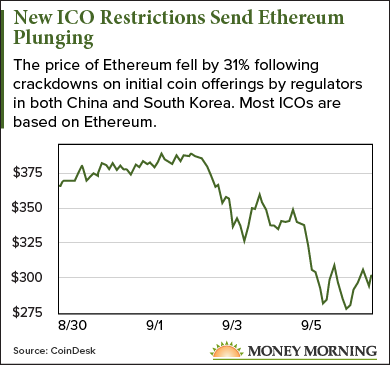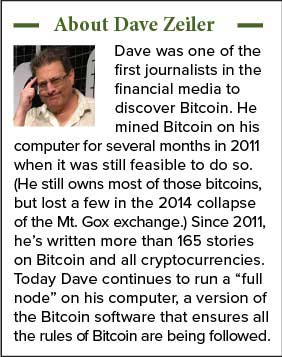This Ethereum price drop was fast and dramatic - 31% in just three days.
There is a silver lining here, though at first glance it's not easy to see.
The news that sparked the falling price of Ethereum this past weekend was grim. Both China and South Korea announced crackdowns on initial coin offerings (ICOs) Sunday and Monday.

That's bad for cryptocurrencies in general, as many were created through ICOs. But it's especially bad for Ethereum. Most ICOs are based on Ethereum. And investors can typically only buy the newly created tokens by using either Bitcoin or Ethereum.
Cryptocurrency prices were a sea of red over the weekend. The fall actually started Saturday as prices began pulling back following a steep rise. The price of Bitcoin, for instance, hit an all-time high of $5,013.91 late Friday.
The plunge accelerated Sunday when South Korean regulators met to discuss plans on tightening oversight of ICOs and cryptocurrency trading. South Korea has an outsized impact on the cryptocurrency markets, as it accounts for about a quarter of global Ethereum trading volume.
Then on Monday (yesterday), Chinese regulators went even further. China declared ICOs an illegal fundraising mechanism. It even ordered existing China-based ICOs to return all funds to investors.
BRILLIANT: Average Americans Are Becoming Marijuana Millionaires
China, too, plays a big role in global cryptocurrency trading. Not only does it account for about a sixth of the world's Bitcoin trading, the majority of Bitcoin mining is done in China.
The losses were ugly. Bitcoin fell as much as 19.5%, the Ethereum price by almost a third.
The total market cap of all cryptocurrencies combined fell 25%, from $180 billion to $135 billion - a loss of $45 billion in three days.
And yet despite all this, the events of this past weekend will prove positive for cryptocurrencies in the long run...
Why the Ethereum Price Drop Is Temporary
Any concern that this weekend's price drop was the beginning of the end for cryptocurrencies already has begun to dissipate. The Ethereum price is off its lows and has stabilized at about $300. The Bitcoin price is back into the $4,400 range.
Most other cryptocurrencies are up today (Tuesday) anywhere from a few percentage points to 15% to 20%.
Related: What's the Best Cryptocurrency to Invest in Today?
That's because what's happening in China and South Korea was inevitable. With ICOs capable of raising millions of dollars in minutes, it was only a matter of time before regulators started to step in.
U.S. regulators have expressed concern as well, although no one has suggested an outright ban on ICOs. But the U.S. Securities and Exchange Commission (SEC) did put out a bulletin in July warning that some ICOs may meet the definition of a security, which would require SEC oversight.
While China's move to ban ICOs is excessive by comparison, regulators there may simply be buying time.
"China, in many ways, is no different than the U.S. or Singapore in saying, OK, we need to push back on these for now until we figure out how to deal with them," Zennon Kapron, director of the Shanghai-based financial technology consultancy Kapronasia, told Reuters. "I think it will be slightly a temporary measure."
The truth is, cryptocurrencies, and ICOs in particular, will benefit from regulations. Here's why...
How Regulations Will Save ICOs and Boost Cryptocurrency Prices
[mmpazkzone name="in-story" network="9794" site="307044" id="137008" type="4"]
Now, cryptocurrency enthusiasts distrustful of government would prefer ICOs remain completely unregulated. But that opens the door to widespread fraud.
Already there have been several ICO-based scams, such as the Ponzi scheme OneCoin. Without regulation, such scams will proliferate.
A lack of a regulatory framework, such as the SEC has with the initial public offerings of stocks, would make it very difficult to tell the legitimate ICOs from the scams. And once that happens, investors will lose faith in the ICO model. It would spell the end of ICOs.
Right now the path ahead is foggy because regulators everywhere need to figure out rules that will allow this creative new form of raising capital to develop and thrive while protecting investors.

For instance, in the United States, regulators are using the Howey Test to determine if an ICO is a security. The trouble is, the Howey Test is based on a 1946 Supreme Court decision that could not have imagined the complexities involved in the selling of digital tokens.
The SEC has no choice but to craft new regulations to govern ICOs, and hopefully will do so in the next year.
Other nations, even those with authoritarian governments like China, will find a way to allow ICOs in some form. The technological and economic promise of ICOs is too great.
You can see now the resilience of Ethereum, Bitcoin, and the other cryptocurrencies despite the threats to ICOs from the world's regulators.
Imagine the boost in price they'll get with the arrival of new rules that permit ICOs, but with protections for investors. These regulations will attract a fresh group of investors, people who liked the idea of ICOs but were put off by the lack of oversight.
That fresh money will drive prices higher, particularly for Bitcoin and Ethereum - the two cryptocurrencies most often used to buy all the others.
Want to Invest in Weed and Don't Know Where to Start? Well over half of the country already has marijuana legally available in some form. Eight states plus our nation's capital have made it completely legal to anyone over the age of 21. And the marijuana stock market is preparing to take off. Watch this short video and see whether jumping on this moon-bound stock rocket is right for you.
Follow me on Twitter @DavidGZeiler and Money Morning on Twitter @moneymorning, Facebook, or LinkedIn.
About the Author
David Zeiler, Associate Editor for Money Morning at Money Map Press, has been a journalist for more than 35 years, including 18 spent at The Baltimore Sun. He has worked as a writer, editor, and page designer at different times in his career. He's interviewed a number of well-known personalities - ranging from punk rock icon Joey Ramone to Apple Inc. co-founder Steve Wozniak.
Over the course of his journalistic career, Dave has covered many diverse subjects. Since arriving at Money Morning in 2011, he has focused primarily on technology. He's an expert on both Apple and cryptocurrencies. He started writing about Apple for The Sun in the mid-1990s, and had an Apple blog on The Sun's web site from 2007-2009. Dave's been writing about Bitcoin since 2011 - long before most people had even heard of it. He even mined it for a short time.
Dave has a BA in English and Mass Communications from Loyola University Maryland.



